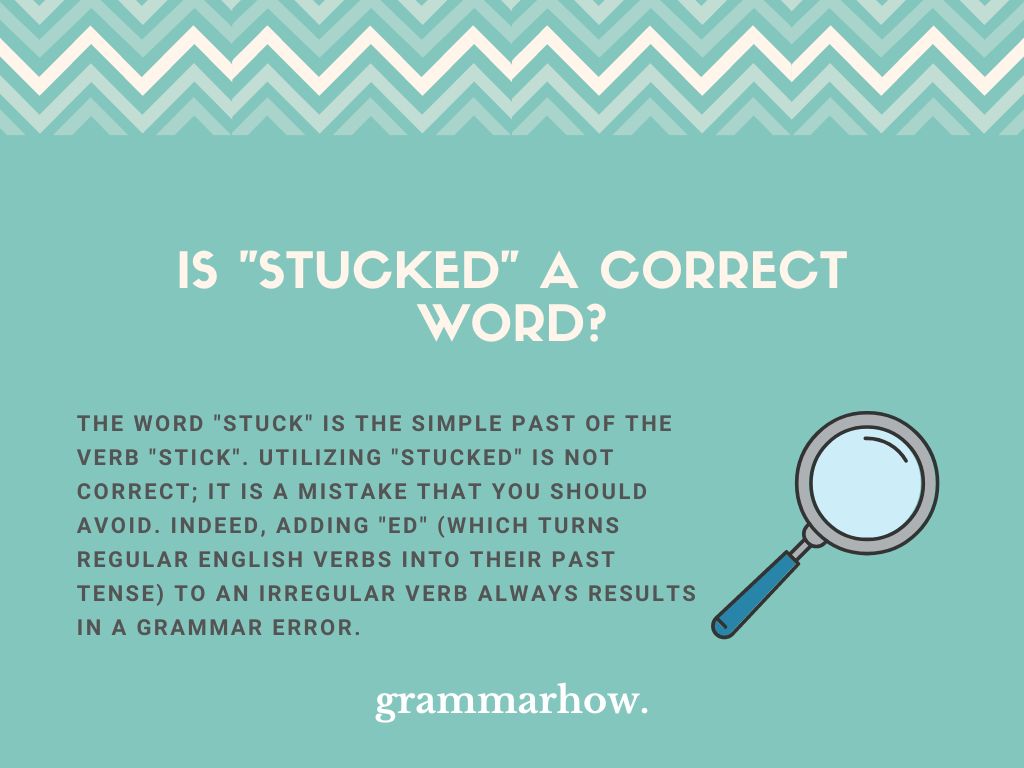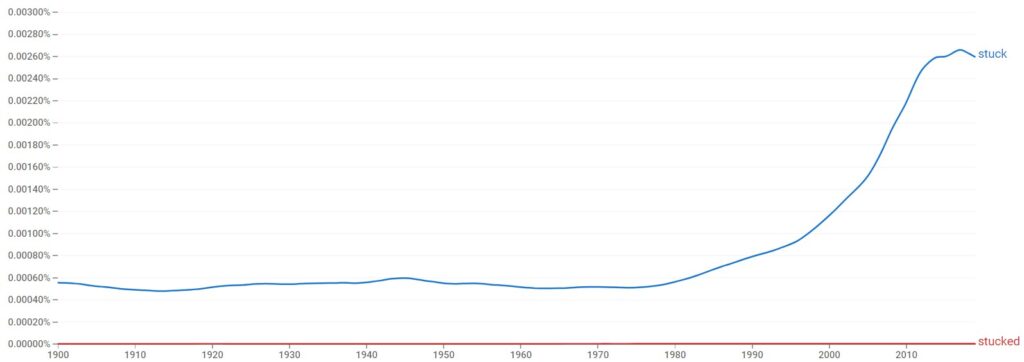Some words in English that present a difficulty when we want to turn them into the past tense. “Stuck” is one of them and we often hear people saying it the wrong way. Don’t worry if you’ve come to that crossroads before; this article will clear your doubts.
Is “Stucked” a Correct Word?
The word “Stuck” is the simple past of the verb “stick”. Utilizing “stucked” is not correct; it is a mistake that you should avoid. Indeed, adding “ed” (which turns regular English verbs into their past tense) to an irregular verb always results in a grammar error.

Transforming every English verb into its past form by adding the “ed” is very common. This approach can take you to several mistakes because in English many irregular verbs don’t follow the formula of adding “ed” to turn it into past tense. Other examples of irregular verbs can be “have”, “do”, and “fall” among many others.
Moreover, the word “stucked” is a deformation of a word that already means the past tense, because “stuck” is the simple past and also participle of the verb “stick”. So, the addition of “ed” to a word that is already in the past tense is a mistake.
Also, you can encounter this incorrect word as an attempt to deform an adjective that is “stuck”. This adjective means to be jammed in a situation, opinion, or physical place.
For example, you can say “I was stuck in the second division and couldn’t make it to the big leagues.” Transforming that “stuck” into “stucked” is a mistake because in that sentence, “stuck” works as an adjective while the verb is “was”. That might be another wrong use of the word “stucked”.
Finally, if you check dictionaries like the Cambridge Dictionary and the Oxford Dictionary, you’ll find that none of them recognize “stucked” as a word.
What Is the Past Tense of “Stuck”?
The word “stuck” is the simple past of the verb “stick”. Yet, “stuck” is also an adjective that means to be jammed in a place, position, or opinion without moving. This often confuses people, but as a verb, “stuck” is past tense, so there’s no past for it.
- Did Michael say he stuck the flag on the boat’s deck before leaving?
- I might have stuck that candle in the attic for you, but I’m not sure.
- He said he stuck the key inside the keyhole and now can’t get it back!
- Martha stuck her pen in her hair so she could make a hairdo and keep the hair out of her face.
- The car tires were stuck on the asphalt because of the heat.
- Meredith stuck a sticker of her band everywhere she went; it was so annoying!
- I stuck my tongue to the ice cream right away before it could melt.
What Are the Different Tenses of “Stuck”?
The verb “stick” is an irregular verb that changes when turned into its past and its participle. Unlike the regular verbs that only need “ed” to be turned into the simple past, “stick” changes differently.
Let’s see how to use “stuck” in the different tenses:
- Verb: Stick
- Past tense: Stuck
- Past Particle: Stuck
How Prevalent Is the Use of “Stucked”?
Although it is incorrect, is the word “stucked” still being used? There’s no tool more powerful than the Google Ngram Viewer. So, we entered the word in the search feature of the tool and the results we got are that the use of “stucked” has grown considerably in the past century but it is still very close to zero.

The word “stuck” on the other hand, the correct past simple and participle of “stick” enjoyed mild and steady popularity until 1980. From that year on, and until 2010, the word enjoyed a steep positive trend being used 200% more than in 1980.
Finally, nowadays, the word “stuck” shows a negative trend that started in 2016.
Final Thoughts
“Stucked” is not a correct word in the English Language. It is an attempt to transform an irregular verb into a regular one by adding the “ed” to transform it into its past. “Stuck” already is the simple past and participle of “stick” and also an adjective (to be jammed).

Martin holds a Master’s degree in Finance and International Business. He has six years of experience in professional communication with clients, executives, and colleagues. Furthermore, he has teaching experience from Aarhus University. Martin has been featured as an expert in communication and teaching on Forbes and Shopify. Read more about Martin here.
